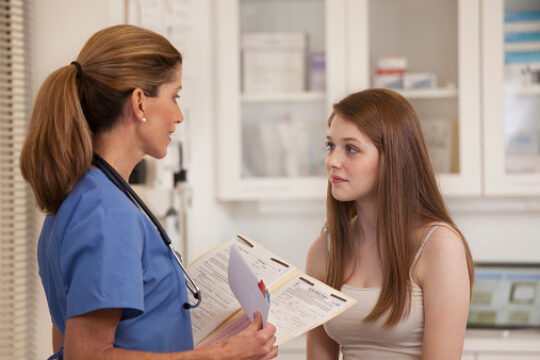What Happens During a Sports Physical?

There are two components of a sports physical: the medical history and the physical exam. The history is an important tool in identifying conditions that might affect an individual's ability to participate and/or perform in sports.
History Examination
Issues addressed during the history portion of the physical include:
- Allergies
- Episodes of dizziness or collapse during activity
- Family history of serious illnesses
- History of asthma
- History of excessive weight loss or gain; can suggest an eating disorder, such as anorexia or crash dieting
- History of past conditions such as fractures, concussions and heat illness
- Menstrual history
- Status of immunizations, particularly tetanus
- Use of contact lenses or dental appliances
- Use of drugs, alcohol, dietary supplements and/or performance-enhancing drugs, such as steroids
Physical Examination
The focus of the physical exam will differ from the history. Evaluations of different body parts and characteristics will be the focus, including:
- Abdomen
- Blood pressure
- Genitals
- Heart (this is done to look for conditions such as murmurs and irregular heartbeat)
- Height and weight
- Lungs
- Vision
The exam might also include an evaluation of musculoskeletal issues such as posture, scoliosis, joint range of motion, knee extension, gait and function of the arms and legs. An assessment of the athlete's flexibility and endurance might also be conducted. The doctor, a coach or an athletic trainer might perform this portion of the exam. If the exam reveals nothing abnormal, the doctor will sign a form stating the athlete is cleared to participate in sports.
What happens if the doctor finds a problem?
The exam helps the doctor identify any conditions or problems that might keep the athlete out of the game or affect performance. If a problem is discovered, the doctor and athlete often can work together to develop a plan to get the athlete ready for competition.
If the doctor finds a problem, he or she might recommend certain tests and a follow-up exam. In many cases, the doctor can suggest treatment or a plan to rehabilitate an injury to get the athlete ready for the sport season. The doctor conducting the exam also works with parents and coaches to assist an athlete with a medical condition so that he or she can compete safely.
If there are no abnormal findings during the exam, the athlete will be cleared to participate in his or her sport. It is important, however, that the athlete report any changes in his or her physical condition, because early diagnosis and treatment can help get the athlete back in the game.
